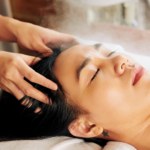Stress is an unavoidable part of life, but too much stress can wreak havoc on your body, skin, and overall health. Dermatologists see, firsthand, how stress manifests physically, from acne breakouts to hair thinning and premature aging. In this post, we’ll dive into practical, science-backed strategies on how to reduce stress while exploring how stress impacts your skin and overall well-being.
If you’re looking for a quick and detailed discussion about how to reduce stress —be sure to check out my video here:
🌿 Watch & Learn:
I’ve put together a quick, easy-to-follow video if you’d like a deeper dive into this topic.
✨ You’ll also find new weekly tips on stress-free skincare, hair wellness, and simple, science-backed beauty — don’t forget to subscribe here!
What Is Stress?
Stress is your body’s response to any demand or threat. When you feel stressed, your body releases cortisol and other stress hormones. While this “fight or flight” response is helpful in emergencies, chronic stress can have harmful effects on your health, including your skin and hair health.
Chronic stress doesn’t just stem from major life events; daily stressors like work deadlines, relationship conflicts, or financial worries can accumulate over time. Understanding your stressors is the first step toward managing them. Keep a journal to identify patterns in your stress triggers.
The Dermatologic Consequences of Stress
Stress isn’t just a mental burden; it has visible consequences for your skin and hair. Here are some common issues:
1. Stress Acne and How to Reduce It
When cortisol levels rise, so does sebum (oil) production, leading to clogged pores and acne breakouts. This is why you might notice pimples popping up during stressful times like exams or work deadlines. Over time, stress can also slow down the skin’s healing process, making blemishes linger longer.
To manage stress-induced acne, focus on maintaining a consistent skincare routine and incorporating anti-inflammatory ingredients like niacinamide and salicylic acid. These ingredients help to regulate oil production and reduce redness.

2. Stress-Related Hair Loss
Stress can trigger telogen effluvium, a condition where hair prematurely enters the shedding phase. You may notice increased hair fall a few months after a particularly stressful period. Stress can also exacerbate underlying conditions like alopecia areata, an autoimmune disorder that leads to patchy hair loss.
Hair loss from stress is often reversible, but it requires patience. Scalp massages with nourishing adaptogenic serums, a balanced diet rich in biotin and omega-3 fatty acids, and stress-reducing practices like yoga can all support recovery.
3. How Stress Causes Premature Aging
High cortisol levels can break down collagen and elastin, the proteins that keep your skin firm and youthful. Over time, chronic stress accelerates the formation of wrinkles and fine lines. Stress also reduces the skin’s ability to retain moisture, leading to dryness and dullness.
Invest in anti-aging skincare products containing retinoids, peptides, and hyaluronic acid. These ingredients help to rebuild the skin barrier and promote collagen production.
4. Psoriasis and Eczema Flare-Ups Due to Stress
Stress is a known trigger for autoimmune conditions like psoriasis and eczema, worsening symptoms like redness, flaking, and itching. These flare-ups occur because stress weakens the immune system, making it more reactive.
Consider incorporating gentle, fragrance-free skincare products and avoiding harsh scrubs. Topical treatments with ceramides and calming botanicals like aloe vera can soothe irritated skin.
How to Reduce Stress: Practical Tips
Practice Mindfulness and Meditation
Mindfulness techniques like meditation or deep breathing can lower cortisol levels. Studies show that even 10 minutes a day can significantly reduce stress. Use guided meditation apps like to get started.
Deep breathing exercises are particularly effective. Try this technique:
- Inhale deeply through your nose for four counts.
- Hold your breath for seven counts.
- Exhale slowly through your mouth for eight counts.
Repeat this cycle three to five times whenever you feel overwhelmed.
Exercise Regularly to Reduce Stress
Physical activity reduces stress hormones while boosting endorphins, your body’s natural mood elevators. Aim for 30 minutes of moderate exercise daily. Activities like jogging, swimming, or even dancing can improve both mental and physical well-being.

Limit Caffeine and Alcohol
Both caffeine and alcohol can amplify stress. Instead, hydrate with water or herbal teas like chamomile, which promotes relaxation, or green tea, which contains L-theanine, an amino acid known for its calming effects.
Build a Support System for Stress Relief
Having a strong network of friends and family can help you manage stress. Sharing your worries with someone who listens and understands can be incredibly therapeutic. If you prefer professional guidance, consider talking to a licensed therapist.
Nourish Your Skin and Body During Stress
Stress compromises your skin barrier, making it more vulnerable to environmental damage. Here are some ways to support your skin:
Adaptogenic Ingredients
Ingredients like ashwagandha, holy basil, and rhodiola help your body adapt to stress. Look for these in skincare products or dietary supplements. Adaptogens also balance cortisol levels, reducing inflammation and improving overall skin health.
Anti-Stress Skincare Routine
Stick to a simple routine with a gentle cleanser, a hydrating serum, and a broad-spectrum SPF. Don’t forget to exfoliate weekly to remove dead skin cells. Use products with antioxidants like vitamin C to combat free radical damage.
Scalp Care Matters When Reducing Stress
Massaging your scalp with oils infused with adaptogens can improve blood flow and reduce stress. Pair your scalp massage with deep breathing for maximum relaxation.

Eat a Balanced Diet to Manage Stress
Nutrition plays a significant role in stress management. Incorporate foods rich in magnesium (like spinach and almonds), vitamin B (like eggs and avocados), and omega-3 fatty acids (like salmon and flaxseeds). These nutrients support brain function and reduce anxiety.

FAQ’s About Stress
How quickly can I see improvements in my skin after reducing stress?
Improvements can be seen within a few weeks of consistent stress management. However, chronic conditions like eczema may take longer to improve.
Can stress alone cause hair loss?
Yes, stress-induced telogen effluvium is a common cause of temporary hair loss. Once stress levels decrease, hair growth typically resumes within 6-9 months.
Are adaptogens safe for everyone?
Adaptogens are generally safe, but consult a healthcare professional before using them, especially if you’re pregnant, breastfeeding, or taking medications.
Stay in the Know. Subscribe.






